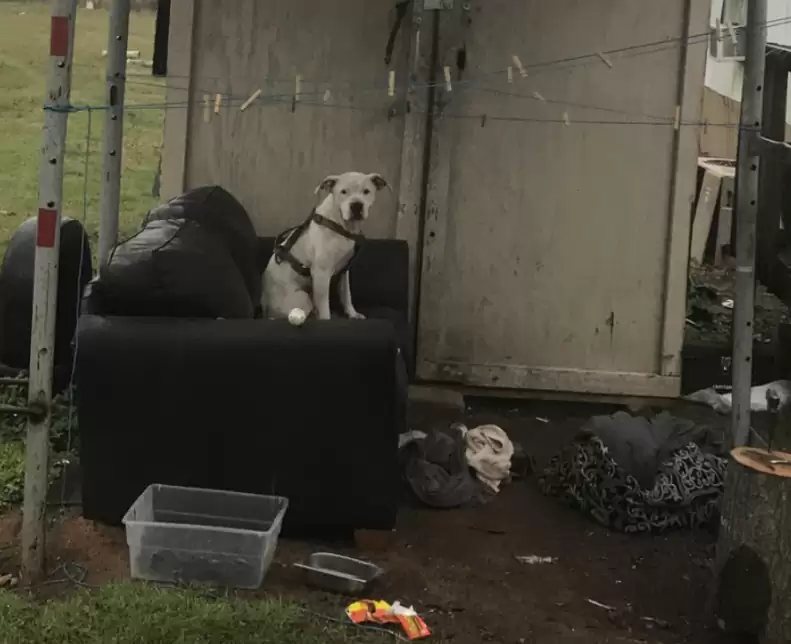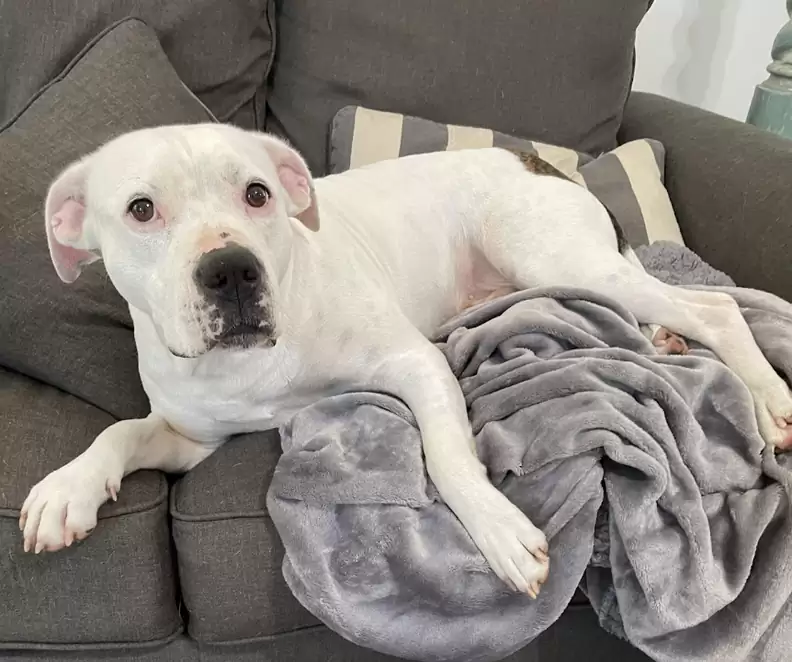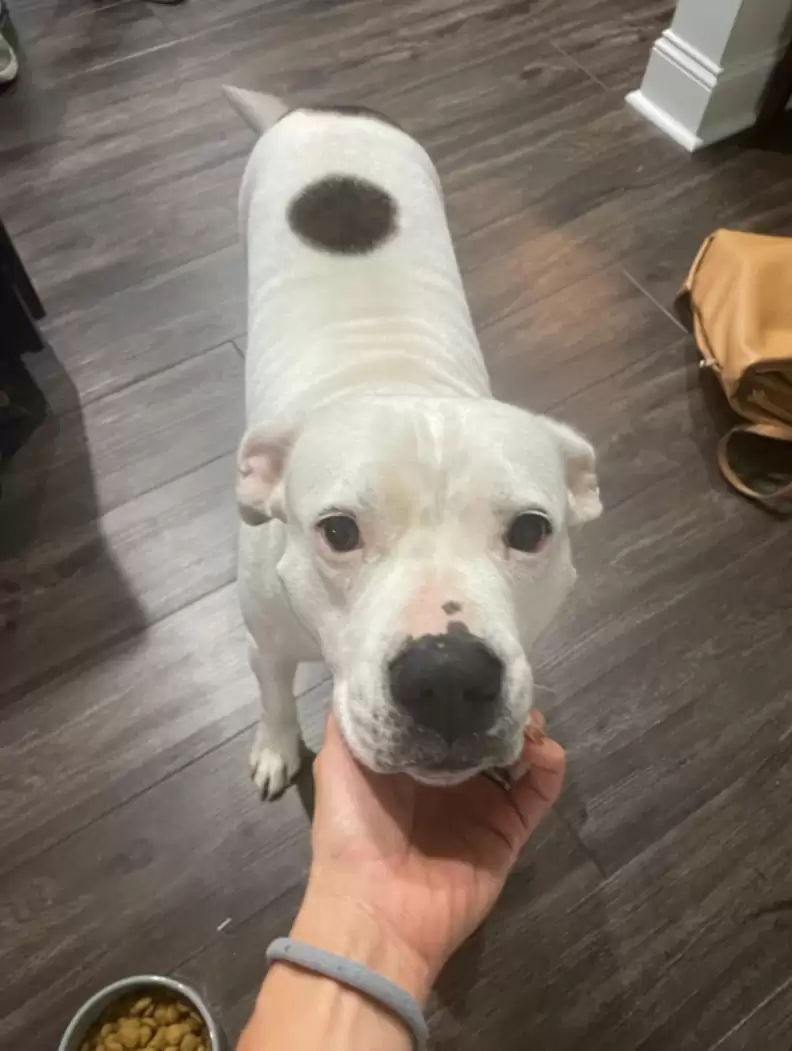Why exactly are dogs so loyal to humans? It’s one of the oldest and most common questions regarding canines.
The simple answer would be that we domesticated them and a bond between the two species was the result. But, it isn’t always like that.
Dogs are pack animals, and because of that, their social attitude and pack mentality is the reason why they are loyal to other dogs or humans.
This is why it’s so disheartening to see that same loyalty not being rewarded. It’s sad when a happy and loyal dog is abandoned by the people he loves the most.
A Depressing Sight

It was a very rainy day in South Carolina when a rescuer, Angela Simmons, went to rescue an abandoned dog from a rainy trailer park.
The neighbors noticed the dog just lying on the couch outside, hoping that someone would come for him, but that didn’t happen, so they called Simmons.
When she came to the dog, she noticed that he was pretty outgoing and wasn’t scared of her. His paws and nose were irritated, likely due to spending so much time outside waiting.
She took the dog to a rescue shelter, called Auction For A Kaws, where they took the dog, now named Murphy, and helped him settle in.
One of the staff members at the shelter told The Dodo: Once he entered foster care, he proved to be the biggest love bug.
A New Beginning For Murphy

Murphy’s spirit grew as time went on, and before you knew it, he was back to enjoying all the fun activities he used to love.
He spent a lot of time on walks, riding in the car, just rolling around in his bed, and lying out in the sun and getting some fresh air.
The staff just loved him so much and everyone who met him was pleasantly surprised by his outgoing nature.
One of the workers there said: He loves other dogs and is very intelligent. He is very eager to learn and has amazing manners.

After he spent some time enjoying fun activities and recovering, the shelter staff decided it was time to put him up for adoption.
They also created a video on their Instagram page to show his story to everyone and potentially find a new family for him.
In the video, the organization said: We are so thrilled to offer Murphy for adoption! Murphy is a 45 pound pit mix located in Greenville South Carolina. He is approximately 3 1/2 years old, housetrained, very loving, walks great on a leash and loves all people.
I am pretty certain that Murphy found a loving family by the time this article was written, but for anyone curious about him, you can contact the organization for more information.
If you’ve ever noticed your furry friend trembling more than usual, it can be concerning. Dogs shaking can be a common behavior with various underlying reasons. Understanding why your dog is shaking excessively is crucial for their well-being. As a seasoned dog trainer, I’ve encountered this issue countless times, and I’m here to shed light on the possible causes behind your dog’s shaky behavior.
When your pup starts shaking, it’s essential to pay attention to their overall demeanor and any accompanying symptoms. While occasional shivers can be normal, persistent shaking might signal an underlying health issue or emotional distress. In this article, we’ll explore the potential reasons why your dog is shaking so much and provide insights on how you can help them feel more comfortable and secure.
Understanding the Canine Shiver: Common Causes of Shaking in Dogs
Stress and Anxiety
Dogs, like humans, can experience stress and anxiety. When your furry friend is overwhelmed or frightened, they may shake as a way to cope with these emotions. Loud noises, being left alone for long periods, or unfamiliar environments can trigger stress in dogs, leading to noticeable shaking. It’s essential to identify the source of stress and provide comfort and reassurance to help your dog feel safe and secure.
Cold Weather Response
Just like you shiver when it’s cold, dogs may shake in response to low temperatures. When the weather is chilly, your pup’s body shakes as a natural response to generate warmth and maintain body temperature. Providing your dog with a warm and cozy environment during cold weather can help reduce their shaking and keep them comfortable.
Excitement or Anticipation
Excitement and anticipation can also cause dogs to shake. Whether it’s the prospect of going for a walk, seeing their favorite toy, or greeting you at the door, dogs may shake with excitement. This happy shaking is often accompanied by wagging tails and joyful expressions. Understanding your dog’s triggers for excitement and giving them the attention and activity they crave can make these shaking episodes a fun and positive experience for both of you.
Medical Concerns Leading to Shakes and Tremors
Pain-Related Shaking
If your dog is shaking, it could be due to pain. Dogs can shake when experiencing discomfort from various issues like arthritis, injuries, or internal problems. It’s essential to monitor your dog and consult a vet to identify and address any underlying pain that may be causing the shaking.
Neurological Disorders
Neurological disorders can also be a reason for your dog’s shakes. Conditions like epilepsy, distemper, or brain tumors can lead to tremors and shaking in dogs. If you notice frequent or severe shaking episodes in your dog, especially coupled with other symptoms like confusion or loss of balance, seeking veterinary advice is crucial.
Poisoning and Toxicity
Ingesting toxic substances can induce shaking and tremors in dogs. Common toxins include chocolate, certain plants, medications, or household chemicals. If you suspect your dog might have ingested something harmful and notice shaking along with symptoms like vomiting or lethargy, contacting a vet or a pet poison hotline immediately is necessary.
Maintain a watchful eye on your furry companion, and if shaking persists or is accompanied by other concerning signs, don’t hesitate to seek professional help to ensure your dog’s well-being.
Behavioral and Environmental Triggers
Fear and Trauma
If your dog is shaking excessively, fear or past trauma could be the culprit. Dogs can shake when they’re scared, anxious, or have experienced a traumatic event. Loud noises, unfamiliar environments, or past negative experiences can trigger this response. It’s essential to create a safe, comforting space for your furry friend to help reduce their fear and shaking episodes.
Noise Sensitivity
Some dogs are more sensitive to noises than others, leading to shaking in response to loud sounds such as thunderstorms, fireworks, or even household noises. This sensitivity can cause distress and anxiety, resulting in shaking episodes. Providing a quiet, secure area for your dog during noisy times can help alleviate their stress and reduce shaking.
When to Consult a Veterinarian
Recognizing Abnormal Shaking
If your dog experiences shaking that is persistent, uncontrollable, or interferes with their daily activities, it’s essential to consult a veterinarian. Abnormal shaking may indicate an underlying health issue that requires medical attention. Pay attention to any changes in your dog’s shaking patterns, especially if it becomes more frequent or severe.
Diagnostic Tests and Evaluations
When you consult a veterinarian for your dog’s shaking, they may recommend diagnostic tests and evaluations to determine the root cause of the issue. These tests could include blood work, X-rays, ultrasound, or neurological examinations. By undergoing these evaluations, your vet can pinpoint any medical conditions or injuries contributing to your dog’s shaking and develop an appropriate treatment plan.
Managing and Treating Your Dog’s Shaking
Calming Techniques for Anxious Dogs
To help calm your anxious dog, try using aromatherapy with lavender or chamomile scents. These scents are known to have relaxing properties that can help reduce stress in your furry friend. Additionally, consider using pressure wraps or vests like Thundershirts, which can provide a sense of security and comfort to anxious dogs.
Providing a Warm and Comfortable Environment
Creating a warm and cozy environment for your dog can help alleviate shaking episodes. Make sure your dog has a comfortable bed in a quiet area of the house where they can relax. Providing cozy blankets and toys can also help make your dog feel safe and secure, reducing anxiety and potential shaking triggers.
Conclusion
So, there you have it – a deep dive into why your furry friend might be shaking so much. From stress and anxiety to medical concerns and environmental triggers, understanding the reasons behind your dog’s shaking is crucial. Remember to create a cozy and safe space for your pup, especially during noisy or stressful times. Trying out calming techniques like aromatherapy or pressure wraps can help alleviate shaking episodes and reduce anxiety. And don’t forget, if your dog’s shaking persists or seems uncontrollable, it’s best to seek advice from a veterinarian to ensure your pet’s health and well-being. Keep your pup happy, safe, and comfortable, and those shaking episodes may just become a thing of the past.
Frequently Asked Questions
What are some common causes of shaking in dogs?
Dogs may shake due to stress, anxiety, cold weather, excitement, or underlying medical issues.
How can I help my dog if it’s shaking excessively due to fear?
Create a safe and comforting environment, provide a quiet space, and offer calming techniques like aroma therapy and pressure wraps.
When should I consult a veterinarian about my dog’s shaking?
If shaking persists, is uncontrollable, or interferes with daily activities, it’s best to seek veterinary advice for proper evaluation and treatment.
[no_toc]

Hey there, I’m Janet Brooks, a dog-loving student from California. I’m all about helping pups in need, especially those without homes. Me and my awesome friends work together to give shelter and love to stray dogs. Oh, and I also write blogs about dogs to share helpful info.